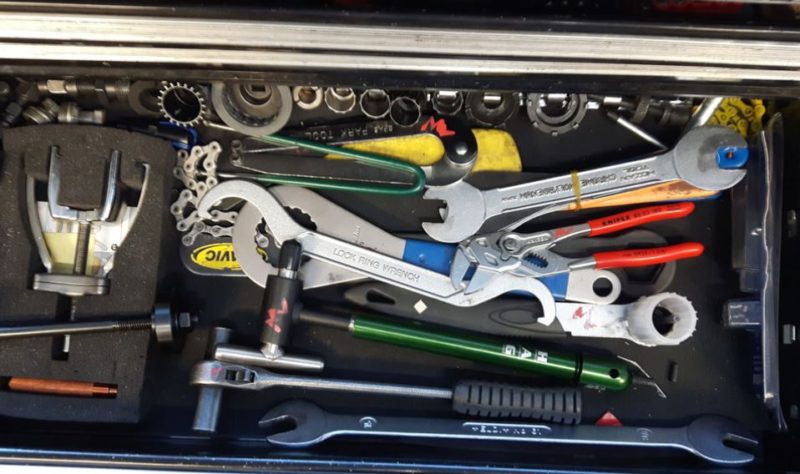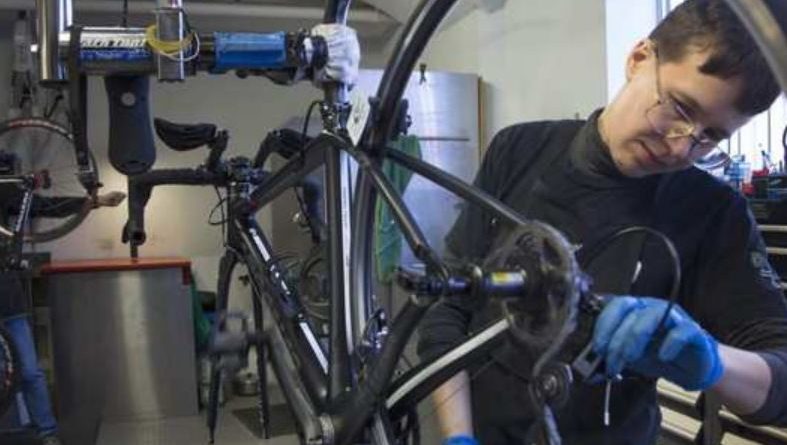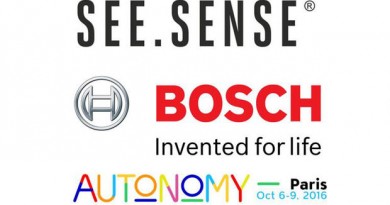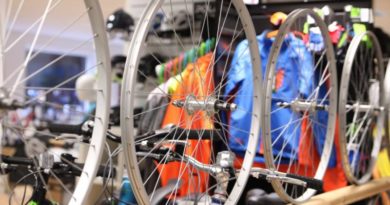Mechanic Monday: Marielle Levine of Montreal, Québec, Canada
In the latest of our Mechanic Monday series – as produced alongside the PBMA, Abbey Bike Tools and People for Bikes – we sit down with Marielle Levine of Montreal-based Cycles Gervais Rioux.
Wherever you are in the world, you can nominate a mechanic worthy of a profile. Simply head here. The Mechanic Monday series will eventually culminate in one lucky participant receiving an all expenses paid trip to the 2019 North American Handmade Bicycle Show, plus an exclusive prize package from Abbey Bike Tools and a year’s subscription the print edition of CyclingIndustry.News.
Marielle Levine has been working in or around the cycling industry for the last 30 years. In that time, she learned from the best, and has become one of the best. Her journey to get to where she is in the industry is as one-of-a-kind as she is, and we are excited to share it with you.
PBMA: How did you become involved in cycling and/or cycling mechanics?
ML: I worked as a bike messenger through Montreal winters in the late 1990’s and early millennium. I had had many frustrating experiences with bike shop employees, which resulted in my getting involved in bike repair co-ops and learning to fix my own bikes. I basically spent the 1990s keeping rusty, worn-out bikes from the 1970s and 1980s on the road.
By the mid-2000s, I was also working as a freelance film subtitle editor, and when the main company I worked for shut down, I got a job at a used-bike shop that had difficulty issuing paychecks. I never did get paid, but after a couple of weeks one of my co-workers left to start a fixie/commuter upcycling shop called Revolution Montreal and I soon followed, working as both a mechanic and salesperson. My brother started dating the owner of the shop, and set up his hair salon on the sales floor, and soon the shop had a reputation as a LGBT-friendly, women-friendly hangout spot. The shop failed mainly due to being massively under financed. It was eventually was sold to two former employees, and became Bikurious Montreal. It was the most feminist place I have ever worked, the only time I’ve worked with other female mechanics.
After that, I started my own short-lived mobile repair business, and quickly realized that I was much more interested in fixing bikes than I was in book keeping.
In 2010, I started working at my first high-end road shop, where the workshop was run by Sasha Bastien. Up until this point, I had never even touched a carbon fiber bike, and most of my skills involved unstucking rusted parts, so I spent the first season terrified that I would break something expensive. When Sasha hired me, he asked me if I wanted to be one of the best mechanics in the city, and he basically taught me how to think like a professional, how to self-educate, and how to sell work that foregrounded safety, compatibility, predictability, and reliability.
In 2015, I started working as a senior mechanic and service manager at Cycles Gervais Rioux, a road and triathlon bike shop that has been owned by the owner of Argon 18 since 1990. This store has a beautiful workshop with a wet-washing station, and a reputation for the highest quality of work, largely due to the presence of Eric Moody, a meticulous and detail-oriented mechanic with a long and respected history in the local racing scene. It’s a lot of fun working on state-of-the-art racing bikes that are pushed to their limits by serious athletes, as well as on the bikes of enthusiasts who want a high-quality, comfortable and worry-free ride. In my role as a service-writer here, it has been extremely satisfying helping customers understand the benefits of having their bikes maintained in peak performance shape and working with them to meet their specific needs.
It’s also been fun working next door to the workshop of Jacques Gallant, a local metal fabricator and framebuilder with lots of interesting knowledge about material properties, tooling, and bike fabrication history. (Last year Jacques built me a 650b road bike that I designed.)
PBMA: What motivates you to excel as one of the few women mechanics in our industry?
ML: Almost every day at work someone (usually a customer or industry rep) challenges my competence, or makes it clear to me that they see me as a novelty or outsider.
In many ways, I am an outsider, and not just because of my gender. I’ve worked in many sport-oriented shops, and I love working with athletes on high-end racing bikes, but, with the exception of a few alleycat races a long time ago, I have never been personally involved in bike racing. I am an unashamed commuter and leisure cyclist. Also, for the past 9 years, I have worked almost exclusively in French, which I speak with an English accent. My accent also leads some people to underestimate my competence.
Being an underestimated outsider motivates me to exceed expectations. Because every move I make is often scrutinized, I am motivated to be intentional and thorough in the way I go about my work in order to produce predictable results. I like to know how a component was designed to work, and to follow the manufacturer’s recommendations when servicing it. For this reason, it has been extremely interesting to work in a shop that has a close relationship with a bicycle engineering and manufacturing company.
PBMA: What advice would you give to girls or women who aspire to be professional bicycle mechanics?
ML: In my mind, the symbol of a smart bike mechanic is someone with a breaker bar in one hand and a torque wrench in the other. I try to check the torque on every bolt, both because my main concern is rider safety, and also because it is a great defense against customers worrying that I might not be strong enough to work on their bike. I like to use leverage instead of brute force to open fasteners because if something goes wrong and I am operating under the limits of my strength, I am more likely to feel the point at which something starts slipping before the tool interface is completely destroyed or something dangerous happens.
If you want a long career as a mechanic, you need to use smart ergonomics and take care of your body. Learn which tools are comfortable and efficient for you to use, and either own your own tools or work for a shop that is committed to buying the tools that are necessary to prevent workplace injury. I originally bought most of my tools when I had a mobile shop, but since then I have had many fewer injuries while working in shops where I’ve been able use my own tools, as opposed to the shops that supplied tools that provided poor leverage, that had handles that hurt my hands, or that made it impossible to use a torque wrench.
I know this is very controversial, but I’m not a big fan of road testing every job. Road tests on road bikes aren’t that useful unless your customer has a similar build and strength to you, whereas many creaking and cracking noises can be reproduced in the shop by grasping the bars and seat and putting pressure on the pedals or cranks, regardless of the size of the bike or mechanic. If you follow manufacturer’s instructions and repeatable procedures, replace worn or damaged parts, and clean the dirty ones, most jobs don’t need a road test. I live in an area where, for half the year there’s a good chance that while I’m doing a tuneup the weather outside is very different from the normal conditions in which the bike is usually ridden. In winter, it makes no sense to take a bike that’s just been overhauled and ride it through the salty, gritty, slushy roads. On top of that, if your shop is in a high-traffic urban area, you might have to go pretty far to find somewhere quiet enough to hear noises coming off the bike. If you think it will be useful to do a road test after the job, you’d better ride the bike before the job as well, so you can observe the effects of your work. If you can’t reproduce the issue, or if the customer doesn’t want to replace incompatible or worn out parts, ask the customer to allow for enough time for them to test the bike (outside or on a trainer) when they come to pick it up, and be careful what results you promise.
PBMA: What is your favorite tool? 
ML: It’s hard to pick favourites. I love whatever tool makes it easier, faster, and more comfortable to accomplish job at hand. When I worked on a lot of vintage bikes, the combination of a Hozan fixed-cup tool and a Park frame bender made me feel like a superhero, and a Bicycle Research crank thread chaser saved many a neglected and DIY-botched crankset. An old Eldi No.61 pedal wrench has near-perfect ergonomics for me. The Abbey HAG is always a pleasure to use. I never install a tight tire without a Kool Stop Tire Bead Jack. My favorite tool that I use the most on high-end bikes is a set of Vessel Rainball hex keys. These keys fit snugly in most bolts, their short and angled heads access hard-to-reach spots, and their alternating flat and wavy faces let them firmly grip bolts that have already been damaged by soft or poorly fitting keys.


